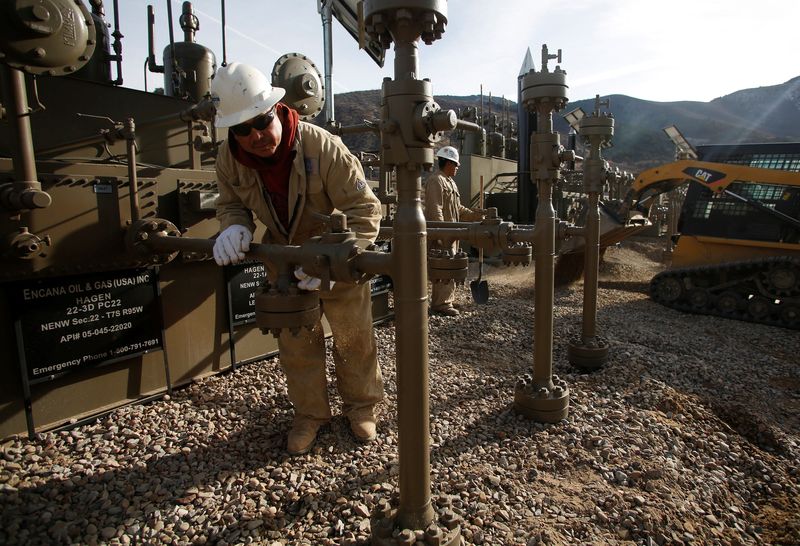By Timothy Gardner and Jarrett Renshaw
WASHINGTON (Reuters) - The Biden administration is holding talks with global energy companies and foreign officials in an effort to set standards for certified natural gas, a form of the fuel that producers market as climate friendly.
The effort comes as the United States seeks to sustain its liquefied natural gas, or LNG, exports to Europe to displace Russian fuel, while also promoting efforts to fight global warming.
A credible market for certified natural gas could help it tackle both goals at once. Gas can be certified as low- or no-carbon if its producers can prove they have reduced greenhouse gas emissions associated with getting it to market, or if they purchase carbon offsets to cut its net climate impact.
"It's a big priority for us to make sure that the role we're playing in ... supplying natural gas to our allies at a time of great energy security need is done in a way that is climate responsible," said Brad Crabtree, an assistant secretary for the U.S. Department of Energy's (DOE) fossil energy and carbon management office.
The United States has become the world’s top gas producer in recent years, and competes with Qatar to be top LNG exporter.
Crabtree said he hosted a workshop in October with gas industry representatives, including a new industry group called the Differentiated Gas Coordinating Council (DGCC), to discuss standards for certified gas.
His office has also had talks with European Union representatives, Japan, Norway, the United Arab Emirates, and Britain, and others on approaches to reduce methane emissions from the industry, a spokesperson said.
On March 9 Crabtree will also host a private meeting on certified gas at the CERAWeek energy conference in Houston with about 20 speakers, according to a copy of the invitation seen by Reuters.
Gas producers have attempted to market certified gas at a premium for years, using third-party certifiers - like non-profit MiQ and startup Project Canary - to prove the fuel has been produced and transported in ways that minimize emissions.
But a lack of unified standards on measuring and verifying emissions across the gas supply chain, and Europe’s energy crisis following Russia’s invasion of Ukraine, have prevented low-carbon gas markets from taking off.
While gas burns cleaner than other fossil fuels, its main component is the powerful greenhouse gas methane, which can leak into the atmosphere from drilling, processing, shipping and distribution.
'CHAOTIC'
Certifiers rely on a dizzying array of competing measurement technologies to evaluate those emissions, including satellites, planes, drones and land-based systems, along with differing methodologies for how to interpret the data.
"The downside of all the innovation and creativity is that it also is very chaotic," Crabtree said.
Tom Hassenboehler, a lobbyist who helped form the DGCC industry group said the administration can help promote the certified gas market by laying out practices and standards to boost trust in the product.
During the Obama administration, the DOE helped build confidence in fracking by collaborating on a report and website on the disclosure of fracking fluids. It could play a similar role in certification markets, said Hassenboehler.
Williams Cos Inc, a gas processing and transportation company aligned with DGCC, says it will certify emissions cuts across the gas supply chain, to be verified by the auditor KPMG, LLP.
“The market is driving that because our customers want to see a credible documentation of the of the emissions,” said Chad Zamarin, a Williams executive vice president. Any government help to "verify that or provide additional comfort ... is something that makes a lot of sense.”
PureWest Energy, a private gas producer aligned with DGCC, did not immediately comment.
MiQ, which says it certifies nearly 20% of U.S. gas output, said Washington needs to show leadership.
"Any silence from the administration on this only results in more opacity and blurriness," said Ben Webster, MiQ's director of policy.
At Project Canary, which is in DGCC and says it certifies nearly 11% of U.S. gas output, Chief Commercial Officer Tanya Hendricks said the administration should use funding from the Inflation Reduction Act to deploy advanced monitoring technologies.
The U.S. does not endorse any one verification system, Crabtree said.
'TRAIN HAS LEFT THE STATION’ If successful, certified gas could help sustain U.S. LNG exports to European markets and put perhaps put pressure on Russia to clean its gas once the war in Ukraine ends, experts said.
The thousands of miles of pipelines from Russian gas fields to Europe leak methane but there is little transparency about how much, said Leslie Palti-Guzman, president and founder of the research group Gas Vista.
Meanwhile, U.S. LNG is not only linked to methane leakage, but takes large amounts of energy to supercool and ship, adding to its carbon footprint.
Nobody knows which is cleaner, "but certified gas could strengthen the case for the U.S. and challenge the Russians to report credible numbers" on its methane emissions, said Robert Kleinberg, a Columbia University research scholar who advises DGCC, free of charge.

Palti-Guzman said certified gas could also be key to securing a longterm role for U.S. LNG in Europe where carbon prices last month hit a record 100 euros per tonne.
"The train left the station," she said. "It's only a matter of time before Europe makes (climate change) a priority again."